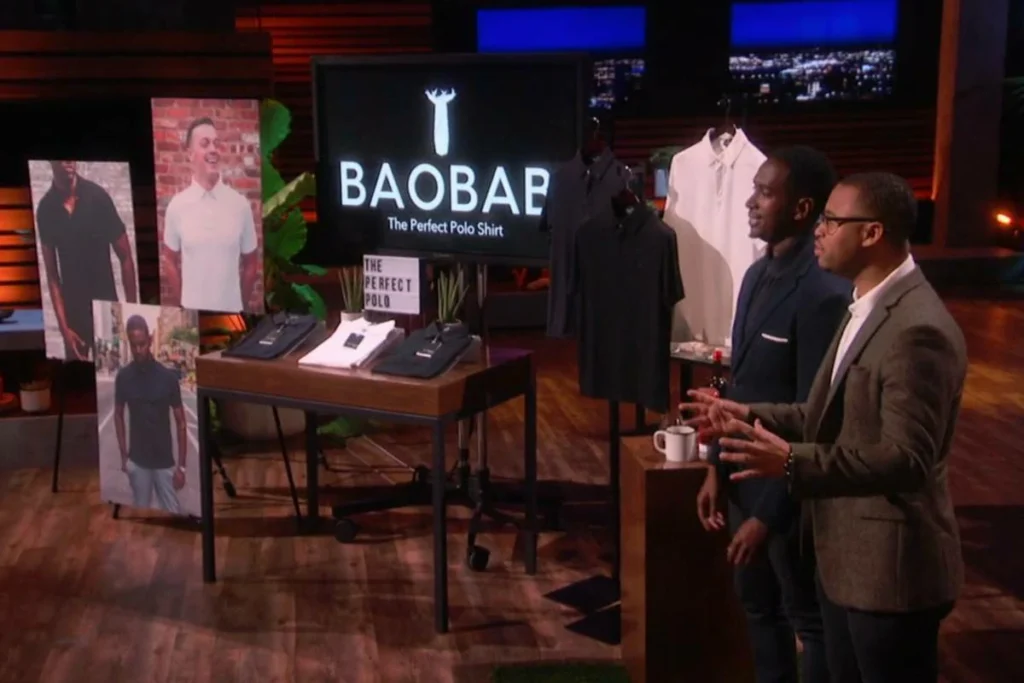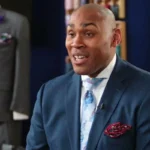What happened to Baobab after their appearance on Shark Tank Season 11? Baobab, the company behind the pima cotton, stain-resistant polo shirts, did not secure an investment on Shark Tank Season 11. Despite showcasing their innovative product and its unique features, the Sharks ultimately declined to invest, citing concerns about the company’s valuation and potential market challenges. While Baobab didn’t receive funding on the show, their appearance helped generate significant brand awareness and publicity, potentially leading to increased sales and future opportunities.
Summary
- Baobab pitched their stain-resistant polo shirts on Shark Tank Season 11.
- The Sharks were impressed with the product’s innovation but had reservations about the company’s valuation.
- Baobab ultimately did not receive an investment.
- Despite not securing a deal, the exposure from Shark Tank likely boosted their brand recognition.
Baobab Shark Tank Update | Shark Tank Season 11
Baobab, a company specializing in stain-resistant polo shirts, entered the Shark Tank in Season 11 with high hopes of securing an investment.
Their innovative product and confident pitch initially captivated the Sharks, but ultimately, concerns about valuation and market potential led to them leaving the Tank without a deal.
Baobab’s Shark Tank Pitch
| Entrepreneurs | Brandon Davenport and Marcellus Alexander III |
|---|---|
| Business | Baobab |
| Ask | $150,000 for 10% equity |
| Deal | No deal |
| Sharks | Mark Cuban, Kevin O’Leary, Lori Greiner, Daymond John, Robert Herjavec |
| Season | Season 11 |
| Original Air Date | January 12, 2020 |
| Website | Baobab |
| Key Points of Pitch |
|
| Why Sharks Declined |
|
1. The Product
Baobab’s flagship product is a stain-resistant polo shirt crafted from premium pima cotton.
The company emphasized its use of innovative fabric technology, ensuring both comfort and durability while resisting common stains like coffee, wine, and ketchup.
2. The Ask
The entrepreneurs behind Baobab sought a $150,000 investment in exchange for a 10% stake in their company.
This valuation implied a company worth $1.5 million, which raised eyebrows among some of the Sharks.
The Sharks’ Response
1. Initial Impressions and Feedback
The Sharks were intrigued by the stain-resistant properties of Baobab’s polo shirts.
They acknowledged the potential market for such a product, particularly among professionals and individuals seeking low-maintenance clothing options.
The quality of the shirts and the passion of the entrepreneurs also garnered positive remarks.
2. Concerns About Valuation and Market
Despite the initial enthusiasm, the Sharks expressed reservations about the company’s $1.5 million valuation.
They questioned whether Baobab had sufficient sales and market traction to justify such a high valuation.
The competitive landscape of the apparel industry and the potential challenges of scaling production and distribution also emerged as concerns.
3. The Final Decision: No Deal
Ultimately, the combination of valuation concerns and perceived market challenges led the Sharks to decline investing in Baobab.
They commended the entrepreneurs on their product and effort but advised them to reconsider their valuation and focus on building a stronger track record before seeking further investment.
While Baobab didn’t secure a deal on Shark Tank, their appearance undoubtedly increased brand awareness and showcased their innovative product to a vast audience.
The feedback from the Sharks also provided valuable insights for the company to refine its business strategy and pursue future growth opportunities.
Baobab’s Journey Beyond Shark Tank
1. Post-Show Update on the Company
Although Baobab didn’t secure an investment on Shark Tank, the exposure proved beneficial. Their website traffic surged, and they gained a wider audience for their stain-resistant polos.
The company continues to operate and refine its product line, focusing on customer feedback and market trends.
2. Sales and Growth Following the Appearance
The Shark Tank effect translated into a significant boost in sales for Baobab.
The increased brand visibility led to new customers discovering their products, and the company reported a substantial increase in orders following the episode’s airing.
This growth allowed Baobab to expand its reach and solidify its position in the market.
3. Lessons Learned and Future Plans
The Shark Tank experience provided valuable lessons for Baobab. The entrepreneurs recognized the importance of aligning their valuation with market realities and demonstrating a clear path to profitability.
They also learned the significance of building a strong brand presence and establishing a loyal customer base.
Moving forward, Baobab plans to leverage the momentum gained from the show to expand its product offerings, explore new sales channels, and continue innovating in the stain-resistant apparel space.
They aim to build a sustainable and successful business that caters to the needs of modern consumers seeking both style and practicality.
The Shark Tank Effect
1. Impact of the Show on Brand Awareness
Baobab experienced a significant boost in brand awareness thanks to their Shark Tank appearance.
Millions of viewers were introduced to their stain-resistant polos, and their brand name became associated with innovation and quality.
This heightened visibility opened doors to new markets and customer segments that may not have discovered Baobab otherwise.
2. Did the Exposure Lead to Increased Sales?
The Shark Tank effect directly translated into increased sales for Baobab. The company saw a surge in website traffic and online orders immediately following the episode’s airing.
This spike in sales not only validated their product’s appeal but also provided the financial boost needed to fuel further growth and expansion.
3. Leveraging the Shark Tank Platform
Baobab capitalized on their Shark Tank appearance by strategically leveraging the platform’s reach and influence.
They actively engaged with their newfound audience on social media, sharing behind-the-scenes content and highlighting customer testimonials.
This approach helped solidify their brand image and foster a loyal community of supporters.
Additionally, the company explored partnerships and collaborations with other Shark Tank alumni, further expanding their network and business opportunities.
Analyzing Baobab’s Business Model
1. Strengths and Unique Selling Points
- Innovative Product: Baobab’s stain-resistant polo shirts fill a gap in the market, catering to individuals who value both style and practicality.
- Premium Materials: The use of pima cotton adds a touch of luxury and ensures comfort and durability.
- Strong Branding: Baobab’s appearance on Shark Tank helped establish a recognizable brand and associate it with innovation.
- Customer Focus: The company actively seeks customer feedback to refine its products and meet evolving needs.
2. Potential Challenges and Areas for Improvement
- Pricing: Premium materials and technology can lead to higher production costs, potentially affecting pricing and market reach.
- Competition: The apparel industry is highly competitive, with established brands and new entrants vying for market share.
- Scalability: Scaling production and distribution while maintaining quality can be a challenge for growing businesses.
- Marketing and Sales: Continuous efforts are needed to reach new customers and expand into different market segments.
3. Evaluating the Market for Stain-Resistant Apparel
- Growing Demand: The demand for stain-resistant apparel is increasing, driven by busy lifestyles and the desire for low-maintenance clothing.
- Diverse Applications: Stain-resistant technology has applications beyond polo shirts, offering opportunities for product expansion.
- Niche Market: While the market is growing, it remains relatively niche compared to the broader apparel industry.
- Evolving Technology: Advances in fabric technology may lead to new competitors and innovations in the stain-resistant space.
Baobab has a solid foundation with its innovative product and strong brand presence. By addressing potential challenges and capitalizing on market opportunities, they can continue to grow and establish themselves as a leader in the stain-resistant apparel market.
FAQs
What is Baobab’s current status?
Baobab is still in business and continues to offer its stain-resistant polo shirts. They are actively refining their products and exploring new growth opportunities.
Are their polo shirts still available for purchase?
Yes, Baobab’s polo shirts are available for purchase through their website. They offer a variety of colors and styles to suit different preferences.
Did any of the Sharks express interest in investing after the show?
There is no publicly available information indicating that any Sharks expressed interest in investing in Baobab after their appearance on the show.
How did Baobab handle the rejection on national television?
Baobab handled the rejection gracefully and professionally. They acknowledged the Sharks’ feedback and used it as an opportunity to re-evaluate their business strategy and make improvements.
What advice would you give to entrepreneurs considering Shark Tank?
Be prepared for tough questions and constructive criticism. Have a clear understanding of your business model, target market, and financial projections. Most importantly, be passionate about your product and demonstrate a willingness to learn and adapt.
The Bottom Line
Baobab’s Shark Tank experience, while not resulting in an investment, proved to be a valuable stepping stone for the company. The exposure and feedback they received helped them refine their business, increase brand awareness, and achieve significant sales growth. Their journey serves as a reminder that even without a deal, Shark Tank can provide invaluable opportunities for entrepreneurs willing to learn and persevere.








